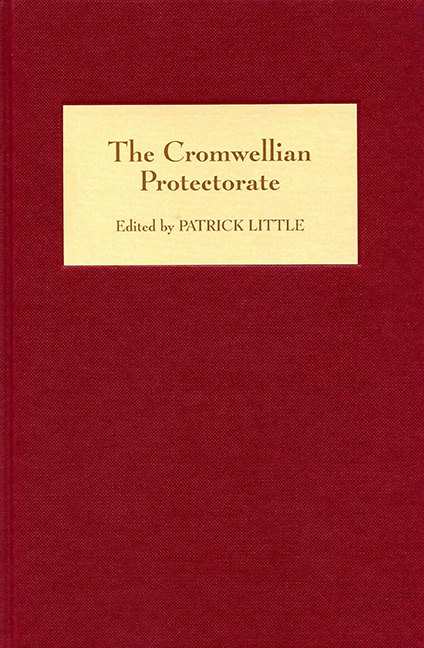Book contents
- Frontmatter
- Contents
- List of Illustrations
- Preface
- Notes on Contributors
- Abbreviations
- 1 Introduction
- 2 Oliver Cromwell and the Protectorate Parliaments
- 3 The Protector Humbled: Richard Cromwell and the Constitution
- 4 Cromwellian Style: The Architectural Trappings of the Protectorate Regime
- 5 Oliver Cromwell and the Council
- 6 ‘To Create a Little World out of Chaos’: The Protectoral Ordinances of 1653–1654 Reconsidered
- 7 The Irish and Scottish Councils and the Dislocation of the Protectoral Union
- 8 ‘This Murmuring and Unthankful Peevish Land’: Wales and the Protectorate
- 9 Cromwellian Towns in the Severn Basin: A Contribution to Cis-Atlantic History?
- 10 Policing the Cromwellian Church: The Activities of the County Ejection Committees, 1654–1659
- Index
9 - Cromwellian Towns in the Severn Basin: A Contribution to Cis-Atlantic History?
Published online by Cambridge University Press: 24 October 2017
- Frontmatter
- Contents
- List of Illustrations
- Preface
- Notes on Contributors
- Abbreviations
- 1 Introduction
- 2 Oliver Cromwell and the Protectorate Parliaments
- 3 The Protector Humbled: Richard Cromwell and the Constitution
- 4 Cromwellian Style: The Architectural Trappings of the Protectorate Regime
- 5 Oliver Cromwell and the Council
- 6 ‘To Create a Little World out of Chaos’: The Protectoral Ordinances of 1653–1654 Reconsidered
- 7 The Irish and Scottish Councils and the Dislocation of the Protectoral Union
- 8 ‘This Murmuring and Unthankful Peevish Land’: Wales and the Protectorate
- 9 Cromwellian Towns in the Severn Basin: A Contribution to Cis-Atlantic History?
- 10 Policing the Cromwellian Church: The Activities of the County Ejection Committees, 1654–1659
- Index
Summary
On a Saturday in the autumn of 1657, a group of seven young gentlemen sat drinking in one of the rooms of the Sun Tavern in Hereford. They were the sons of justices of the peace, tax commissioners or even members of parliament in one or other of the three Parliaments to have assembled that far into the decade. Whether through some earlier provocation or mere binge drinking, a quarrel broke out between the young gentry and some lower class men in another room of the city-centre inn, in which John Holmes's sword was grabbed by one of the weaponless local oiks, who used it to lunge at Francis Pytt. In the ensuing uproar on the stairs and in the courtyard, the constables gave way to a detachment of soldiers sent by the godly governor, Colonel Wroth Rogers, who escorted the young drinkers to the garrison, a fortress whose continued upkeep in Hereford castle had been personally sanctioned by Lord Protector Oliver Cromwell. There, a further quarrel broke out between one of the detainees, Richard Walwyn of Much Marcle, and another gentleman under arrest in the castle, who offered to ‘fight any governor in England’. In the depositions that were taken in the city sessions court over the following days, when heads were less confused but more painful, it emerged that what had sparked the attack on Pytt was his assailant's belief that he was ‘a Hilliard, a Hilliard’, somehow connected with Colonel William Hilliard, a successful but notorious Barbados planter, who was buying himself into Herefordshire society. Hilliard had been building up a labour force of indentured servants and slaves since the late 1640s, and had advised the commonwealth government in 1650 on how best to reduce Barbados to obedience. Resentment at the intrusion of this interloper mingled with hostility to the intervention of the military in what traditionally would have remained a fight policed by the petty constables. In this climate, perceived tramplings on codes of honour, such as Richard Walwyn's refusal to respond like a gentleman to a challenge to a duel, were felt keenly.
- Type
- Chapter
- Information
- The Cromwellian Protectorate , pp. 165 - 187Publisher: Boydell & BrewerPrint publication year: 2007



